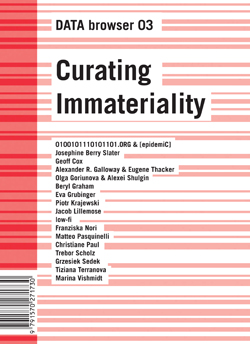Joasia Krysa (ed.): Curating Immateriality: The Work of the Curator in the Age of Network Systems (2006)
Filed under book | Tags: · aesthetics, art, collaboration, curating, database, exhibition, internet, internet art, labour, media art, museum, net art, open source, relational aesthetics, software art, technology

“The site of curatorial production has been expanded to include the space of the Internet and the focus of curatorial attention has been extended from the object to processes to dynamic network systems. As a result, curatorial work has become more widely distributed between multiple agents, including technological networks and software. This upgraded ‘operating system’ of art presents new possibilities of online curating that is collective and distributed — even to the extreme of a self-organising system that curates itself. The curator is part of this entire system but not central to it.
The subtitle of the book makes reference to the essay ‘The Work of Culture in the Age of Cybernetic Systems’ (1988), in which Bill Nichols considered how cybernetics transformed cultural production. He emphasised the shift from mechanical reproduction (symbolised by the camera) to that of cybernetic systems (symbolised by the computer) in relation to the political economy, and pointed to contradictory tendencies inherent in these systems: ‘the negative, currently dominant, tendency toward control, and the positive, more latent potential toward collectivity’. The book continues this general line of inquiry in relation to curating, and extends it by considering how power relations and control are expressed in the context of network systems and immateriality.
In relation to network systems, the emphasis remains on the democratic potential of technological change but also the emergence of what appears as more intensive forms of control. Can the same be said of curating in the context of distributed forms? If so, what does this imply for software curating beyond the rhetoric of free software and open systems?”
Contributors: 0100101110101101.ORG & [epidemiC] | Josephine Berry Slater | Geoff Cox | Alexander R. Galloway & Eugene Thacker | Olga Goriunova & Alexei Shulgin | Beryl Graham | Eva Grubinger | Piotr Krajewski | Jacob Lillemose | low-fi | Franziska Nori | Matteo Pasquinelli | Christiane Paul | Trebor Scholz | Grzesiek Sedek | Tiziana Terranova | Marina Vishmidt
Publisher Autonomedia/I-DAT, 2006
Creative Commons License
DATA browser series, 3
ISBN 1570271739
288 pages
PDF (14 MB, added on 2018-3-29)
PDFs (updated on 2016-12-12)
Ned Rossiter: Organized Networks: Media Theory, Creative Labour, New Institutions (2006)
Filed under book | Tags: · creative industries, critique, democracy, governance, information society, intellectual property, internet, labour, media theory, networks, technology

The celebration of network cultures as open, decentralized, and horizontal all too easily forgets the political dimensions of labour and life in informational times. Organized Networks sets out to destroy these myths by tracking the antagonisms that lurk within Internet governance debates, the exploitation of labour in the creative industries, and the aesthetics of global finance capital. Cutting across the fields of media theory, political philosophy, and cultural critique, Ned Rossiter diagnoses some of the key problematics facing network cultures today. Why have radical social-technical networks so often collapsed after the party? What are the key resources common to critical network cultures? And how might these create conditions for the invention of new platforms of organization and sustainability? These questions are central to the survival of networks in a post-dotcom era. Derived from research and experiences participating in network cultures, Rossiter unleashes a range of strategic concepts in order to explain and facilitate the current transformation of networks into autonomous political and cultural ‘networks of networks’.
Publisher: Eelco van Welie, NAi Publishers, Rotterdam
In association with the Institute of Network Cultures, Amsterdam
ISBN 9056625268, 9789056625269
250 pages
Fadaiat: Freedom of Movement – Freedom of Knowledge (2006) [Spanish/English/Arabic]
Filed under book | Tags: · citizenship, gibraltar, globalisation, labour, migration, network society, technology

“The straits of Gibraltar is a mirror-territory of the transformations taking place in the world today: globalisation, migrations, borders, citizenship, network-society, communication, technologies… The border is a crossed-place, an extensive territory of life and mobile confinements where multiple social practices put pressure on established limits. New spaces and relationships emerge from and through the border between southern europe and northern africa.
The book and all it entails plays an important and irreplaceable role, but it is just a fragment of a process that goes far beyond it in terms of both time and subject matter. Here it opens new possible becomings that were mere conjectures until it was written; it is a line with relative autonomy running parallel to the other relatively autonomous part-projects and establishing fruitful exchanges among them, which in turn become an opportunity for new projects.
Through this process, and specially the publishing of this book, we want to contribute to the existence of new spaces of social and technological hybridisations that, by forging new paths, continually (re)invent world(s).”
A book was developed in connection to event Fadaiat: Freedom of Movement – Freedom of knowledge.
Authors: Pilar Monsell Prado, Pablo de Soto Suárez, Joan Escofet Planas, José Pérez de Lama, Marta Paz Naveiro, Mónica Lama Jiménez, Helena García Rodríguez, Sergio Moreno Páez
Published by Observatorio Tecnológico del Estrecho
209 pages
License: Aire Incodicional
PDF (Part 1: visuals; no OCR)
PDF (Part 2: articles)

